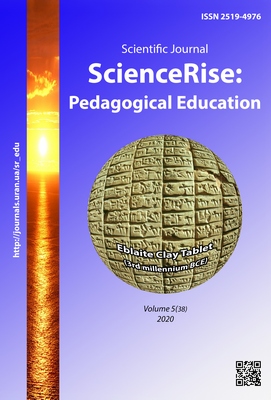Realities of practical andragogy in the condition of the COVID-19 pandemic: migration pedagogy in Ukraine
DOI:
https://doi.org/10.15587/2519-4984.2020.212892Keywords:
andragogy, lifelong learning, migration pedagogy, COVID pandemic, electronic diaryAbstract
The purpose of this article is to make recommendations for the organization of adult education in quarantine conditions: exchange of experience.
The article identifies that "Lifelong Learning" is one of the priorities of society in all countries, focusing on such potentials of andragogy as promoting the social adaptation of adults and addressing issues of labor migration. In the conditions of COVID-19, an effective form of work was interactive communication through e-mail, work in Viber-groups and the use of the electronic platform ZOOM for distance lectures. It has been proven, that the methods of work of a teacher and an andragogue are not identical: adult learners and full-time university students are different mental subjects of education. The theory and methodology of teaching economic disciplines in these two varieties are very different. The authors present the results of the analysis of modern scientific sources, which testify in favor of the need for further development of andragogical learning technologies. The experiment of this study and comparative analysis was not planned, it took place for objective reasons, caused by the COVID-19 pandemic. The obtained results in practical andrаgogy are useful for teachers-practitioners, andragogues, employment services - especially in cases of force majeure in adult education (COVID and others) and for quality administrative control over the learning process in extreme conditions or at a distance operating mode
Downloads
Published
How to Cite
Issue
Section
License
Copyright (c) 2020 Iryna Deineha, Larysa Hromozdova, Valeriia Kovach

This work is licensed under a Creative Commons Attribution 4.0 International License.
Our journal abides by the Creative Commons CC BY copyright rights and permissions for open access journals.
Authors, who are published in this journal, agree to the following conditions:
1. The authors reserve the right to authorship of the work and pass the first publication right of this work to the journal under the terms of a Creative Commons CC BY, which allows others to freely distribute the published research with the obligatory reference to the authors of the original work and the first publication of the work in this journal.
2. The authors have the right to conclude separate supplement agreements that relate to non-exclusive work distribution in the form in which it has been published by the journal (for example, to upload the work to the online storage of the journal or publish it as part of a monograph), provided that the reference to the first publication of the work in this journal is included.







